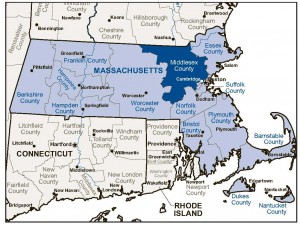
Middlesex County was created on 10 May 1643 as one of the original four counties of the Massachusetts Bay Colony. The other original counties were Essex, Suffolk, and a now extinct Norfolk – a name later reused for a different geographic region in the state.
At its founding, Middlesex County covered a broad swath of Massachusetts. The county was bordered to the north by New Hampshire, to the east by Essex County, to the south by Suffolk County, and to the west by New York – until Hampshire County was created in 1662. Middlesex’s western boundary was altered again by the creation of Worcester County in 1731. Now, and for the first time ever, historic Middlesex County probate records are fully searchable online – and for free!
Throughout the period covered in these records, Middlesex was the most populated county in Massachusetts, with some 275,000 residents by the 1870 U.S. census. Available on AmericanAncestors.org, and made possible through a partnership with the Massachusetts Supreme Judicial Court Archives, this database includes more than 45,000 probate cases between 1648 and 1871. The cases include wills, guardianships, administrations, and various other types of records.
Probate records are data-rich genealogical documents often containing information about the date and place of death of the subject, the subject’s marital status, spouse’s name, children’s names, relationships between family members, residences, inventories of property, and perhaps even the subject’s mark or signature. For a New England researcher, these records should prove invaluable for providing detailed information on individuals who resided in the region from its earliest days to the late nineteenth century.
The following towns – with the year in which they were established – are included in this database:
Acton (1735), Arlington (1807), Ashby (1767), Ashland (1846), Bedford (1729), Belmont (1859), Billerica (1655), Boxborough (1835), Brighton* (1806), Burlington (1799), Cambridge (1636), Carlisle (1780), Charlestown* (1630), Chelmsford (1655), Concord (1635), Dracut (1701), Dunstable (1673), Everett (1870), Framingham (1700), Groton (1655), Holliston (1724), Hopkinton (1715), Hudson (1866), Lexington (1713), Lincoln (1754), Litchfield** (1734) Littleton (1715), Lowell (1826), Malden (1649), Marlborough (1660), Medford (1630), Melrose (1850), Natick (1781), Newton (1688), North Reading (1853), Nottingham** (1733), Pepperell (1775), Reading (1644), Sherborn (1674), Shirley (1775), Somerville (1842), Stoneham (1725), Stow (1683), Sudbury (1639), Tewksbury (1734) , Townsend (1732), Tyngsborough (1809) , Wakefield (1812), Waltham (1738), Watertown (1630), Wayland (1780) , Westford (1729) , Weston (1713), Wilmington (1730), Winchester (1850), and Woburn (1642).
* Brighton and Charlestown were annexed by Boston in 1874.
** Litchfield and Nottingham were ceded to New Hampshire in 1740.
Happy searching!
Thank you for this information Ryan, but seeing the records is not free. One must sign up for ancestry.com.
Hi, Roger, these searchable Middlesex County probate records are exclusive to our website, AmericanAncestors.org, and they are available to search for free by clicking the link in my post above or by clicking here: http://www.americanancestors.org/Search.aspx?Da=0536
We have made the full cases searchable and provide digital images of all the original pages. Ancestry.com’s database of a similar name is only an index to the cases.
To all of you who worked on this critical database, thank you, thank you, thank you! This is terrific.
This California resident thanks AmericanAncestors.org for bringing me this treasure. I’m going digging!
This is wonderful news. Thank you for letting us know.
EXACTLY the kind of public/proprietary partnership outcome the Society needs to become even more the research destination it is developing itself as. Kudos to the technical staff and to the leadership staff. Also, congrats to you on your (not-so-recent) promotion, and thanks personally for your prompt “Cust Serv” email exchanges with me in your prior role.
When you say the full cases are searchable, does that mean that all the people mentioned as legatees, etc. are indexed, not just the decedent? Also I am wondering if there is a project to do the same for Norfolk County? I am struggling with an ancestor who was probably born in either Newton (Middlesex) or Needham (Norfolk) in 1787 or thereabouts.
Oh how grateful I am for the Middlesex County Database, my ancestors were there from the 1600’s. I am working on joining the DAR, this will be most helpful for me.
Keep in mind many other New Hampshire Towns were also part of Middlesex County until 1741-1746 when the State line was drawn. Those Towns included Nashua, Hollis, Hudson(then called Nottingham ), Pelham, Parts of Milford , most of Amherst and Merrimack, A small section of Brookline and a small section of Londonderry. Londonderry was in dispute with New Hampshire from its settlement in 1726 until 1741-1746. Litchfield was split off from Dunstable in 1732 and also included Merrimack just north of the Souhegan River. All of the Towns above would have been part of the all encompasing Dunstable Massachusetts which also included Tyngsborough Massachusetts .
Tyngsborough , Dunstable, Westford, and Pepperell Masssachusetts were part of Groton and Chelmsford both incorporated in 1655 until Dunstable was split off in 1673. When you look at the probate records you will see some New Hampshire Towns mentioned this may be a clue to the age of the property or structure if it still exists.
Will the database be open to guests permanently? I’d like to announce it in our genealogical society newsletter, if it is.
Mr. Woods, the link given above is no longer active. What is the current link for free access to the Massachusetts Middlesex County probate records? -Chris Hurley
Seee the above post, “Mr. Woods, the link given above is no longer active. What is the current link for free access to the Massachusetts Middlesex County probate records? ” Is there a new link??? Shon